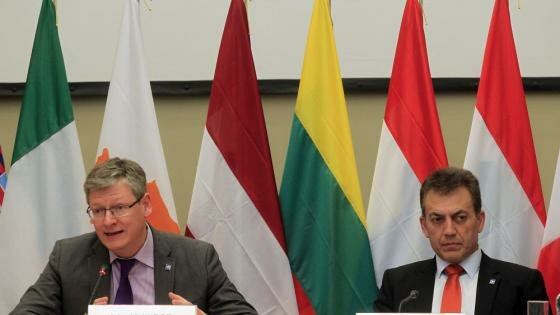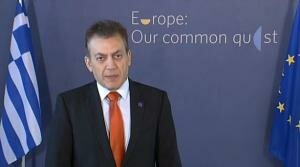- EPSCOEmployment, Social Policy, Health and Consumer Affairs Council (EPSCO)
Job rich recovery and undeclared work, the focus of the Employment Ministers Meeting in Athens
Ministers for Employment and Social Policy of the European Union had the opportunity to exchange views and best practices on Europe 2020 Strategy core issues, issues that concern each European citizen. The contribution of these issues to the goal of economic recovery with more jobs and quality jobs and stronger social cohesion is crucial.
On 30 April, at the morning plenary session, the President of the Council, Minister of Labour, Social Security and Welfare of Greece, Ioannis Vroutsis, highlighted that Europe has entered a path to recovery. However, the goal is to lay strong foundations for enhancing the recovery, with special attention to those mostly hit by the crisis.
Afterwards, the key findings from the meetings held on 29.04.2014 were presented. The first meeting with the Social Platform focused on the role of minimum income schemes in economic recovery. The issue of labour market reforms on the way to job rich recovery was discussed at the second meeting with the Social Partners.
Two parallel workshops took place under the general title: “The Employment and Social Dimension of the Europe 2020 Strategy: Lessons Learnt and Future Orientations”.
The Italian Minister of Labour and Welfare, Giuliano Poletti, chaired the first Workshop with the theme: “Labour Market Reforms on the Way to Job Rich Recovery. Combatting the long-term unemployment and increasing the participation in the labour market. The role of wage setting systems and reforms on Employment Protection Legislation”. The Greek Minister of Labour, Social Security and Welfare, Ioannis Vroutsis, chaired Workshop II, the theme of which is “Economic recovery and social policies: the role of minimum income schemes”.
The afternoon plenary session, chaired by Mr. Vroutsis, focused on the issue of undeclared work. Ministers exchanged views and experiences on the topic: “Towards quality jobs: measures to prevent undeclared work”.
Ministers for Employment and Social Policy of the European Union, participating at the meeting, welcomed the initiative of the Greek Presidency to include this issue in the agenda of the Informal EPSCO meeting. Combating undeclared work is one of the Priorities of the Greek Presidency in the field of employment and social policy.
The Greek Minister underlined that the issues of quality jobs and tackling undeclared work are crucial, for achieving both sustainable recovery and the main objectives of Europe 2020 strategy. He added that facing up to the challenge of undeclared work demands both preventive and repressive actions.
During the closing session, the President made the following remarks:
Minimum Income Schemes should be designed in a way to provide adequate protection, broad coverage and be characterised by administrative simplicity. Furthermore, schemes should be accompanied by proper activation and training measures as well as the provision of services. While these systems provide for a social shield, we cannot forget that they should operate temporarily as a mechanism to tackle poverty and that the focus of all relevant policies remains the successful labour market integration. The aim is to prevent beneficiaries from being trapped by these schemes and to help re integrate them into the labour market.
It is necessary to remain on the path of reforms so that labour market performances be improved. These reforms must balance the need for improvement in the labour market functioning and quality of work. In order to achieve that, cooperation with the social partners is essential as well as responsible social dialogue, thus contributing to the enhancing of the social dimension of the EMU.










